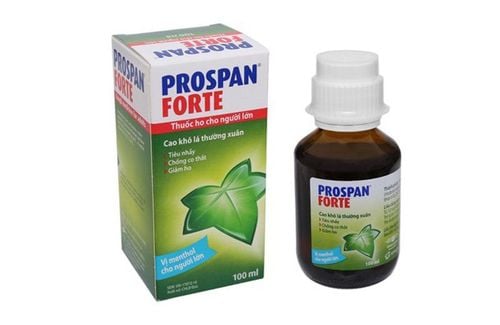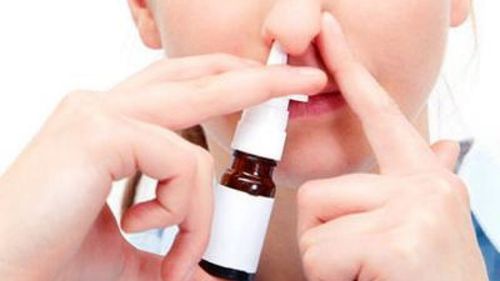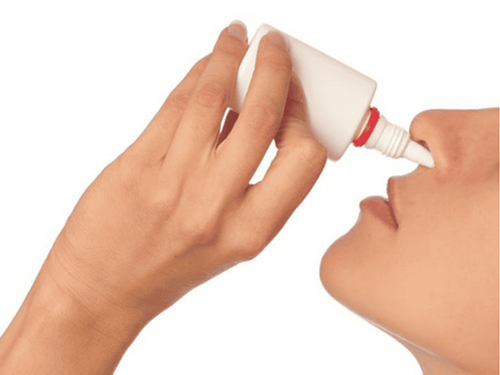This is an automatically translated article.
Upper respiratory tract infection is a common disease in infants, especially the disease often occurs in seasonal or cold weather. Good treatment of the symptoms of the disease plays a very important role in helping children recover quickly and reduce the risk of complications from the disease.1. Causes of upper respiratory tract infections in infants
The upper respiratory tract includes the nose, pharynx, pharynx, sinus system, middle ear, and larynx. Upper respiratory tract inflammation is inflammation of the lining of the upper respiratory organs, including a complex of diseases as diverse as colds, pharyngitis, nasopharyngitis, laryngitis, sinusitis,...Origin The cause of upper respiratory tract infection is mainly caused by respiratory viruses such as: Rhinovirus, Adenovirus, Coronavirus, influenza virus, ... Some bacteria such as: Pneumococcus, group A hemolytic streptococcus and some types mushroom. Most babies with weak resistance are very susceptible to upper respiratory infections. Especially when babies are born prematurely, have low birth weight, rickets, are malnourished, are immunocompromised due to HIV infection or prolonged corticosteroid therapy. Respiratory infections in children also often occur in children living in a humid, cramped environment, often exposed to cigarette smoke, kitchen smoke or lying in a low-temperature air-conditioned room.
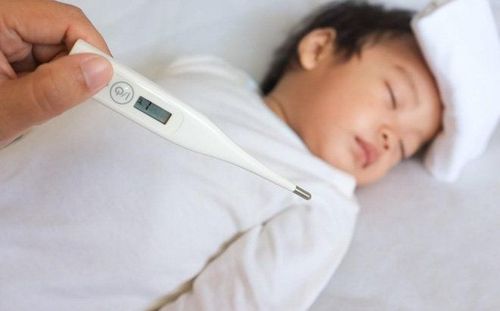
Trẻ bị suy giảm hệ miễn dịch có nguy cơ viêm đường hô hấp cao
2. Symptoms and complications of upper respiratory tract infection
Younger children are more susceptible to upper respiratory infections, especially children under two months of age. Symptoms of the disease are usually mild fever, about 38.5 degrees, other common symptoms are cough, runny nose, wheezing, regurgitation, fussiness, stop feeding,...Cough and vomiting are symptoms. common in most neonatal upper respiratory tract infections. Cough is a good response of the body to help expel secretions, foreign bodies, ... in the upper respiratory tract out, helping to protect the body, so parents should not be too worried when children cough.
3. Treatment of cough, regurgitation when there is an upper respiratory tract infection in infants
To help the child cough and expel phlegm effectively, parents can support the child's back pat.
Should do back patting before meals or at least one hour after meals to avoid causing vomiting. Parents cupped their hands, keeping their thumbs pressed against their index fingers, patting the child's back to the left and then to the right, for about 3-5 minutes in each area. If coughing too much makes children lose sleep and fatigue, parents can give children safe cough remedies such as lemon basil leaves, blueberries steamed with rock sugar or honey, steamed white roses with rock sugar, orange tea herbs, ... Or give children the use of herbal cough syrups suitable for young ages. When the child vomits, parents let the child lie down with his head to the side when vomiting, clean the vomit in the mouth, nose, and throat of the child. Use warm water to wipe the vomit from the body and change the baby's clothes. Instead of feeding the baby every time it is too full, the mother should feed the baby many times, each time a small amount. Parents should not arbitrarily give children anti-emetics without a doctor's prescription. Take the child to the doctor immediately if the child vomits a lot with signs of dehydration such as dry mouth, sunken eyes, wrinkled skin, ... When the child has a fever with an upper respiratory infection, dress the child in thin clothes and lie in a well-ventilated room. cool, use a soft towel dipped in warm water, wring it dry, and wipe the forehead, armpits and groin to reduce the child's temperature. If the child's fever is above 38.5 degrees, give the child fever-reducing medicine as directed by the doctor. To keep the child's airway open when the child has a runny or stuffy nose, use physiological saline drops into each nostril, then use a clean dry cotton swab to clean it again. Place the baby on the top or hold the baby in an upright position to make it easier for the baby to breathe.
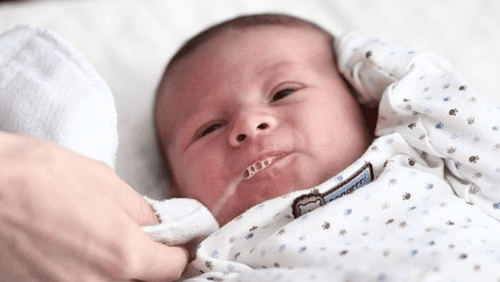
Mẹ có thể xử lý tình trạng nôn, trớ cho bé tại nhà
4. Measures to prevent upper respiratory tract infections in infants
To prevent upper respiratory tract infections in babies, parents need to keep the children's sleeping and living areas clean. If using an air conditioner, the temperature should not be too low, keeping the temperature around 25-26 degrees is appropriate. When the weather turns cold, parents should pay attention to keeping the child warm in accordance with the decrease in the outside temperature, letting the child wear more warm clothes, woolen hats, socks, hand-tied... when going out. Avoid exposing children to cigarette smoke, dust, and polluted air. Breast milk is not only a valuable source of nutrients to help children develop physically, but also provides an abundant amount of antibodies to help children fight diseases. Exclusive breastfeeding for the first 6 months of life is an effective way to help prevent the risk of upper respiratory tract infections. Mothers need to feed their babies enough times during the day. When older children enter the weaning stage, mothers need to build a balanced menu with enough nutrients for the child. Parents and caregivers need to wash their hands with soap before preparing food for children or caring for children. Take children to be vaccinated with all vaccines according to the national immunization program to help them build immunity against dangerous respiratory diseases. Do not expose children to people with respiratory symptoms. Any questions that need to be answered by a specialist doctor as well as if you want to be examined and treated at Vinmec International General Hospital, you can contact Vinmec Health System nationwide or register online. online HERE.




